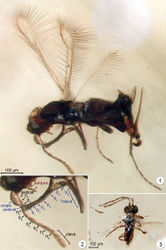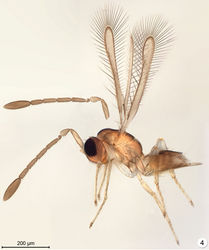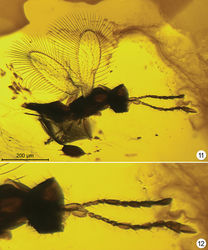Myanmymar
| Notice: | This page is derived from the original publication listed below, whose author(s) should always be credited. Further contributors may edit and improve the content of this page and, consequently, need to be credited as well (see page history). Any assessment of factual correctness requires a careful review of the original article as well as of subsequent contributions.
If you are uncertain whether your planned contribution is correct or not, we suggest that you use the associated discussion page instead of editing the page directly. This page should be cited as follows (rationale):
Citation formats to copy and paste
BibTeX: @article{Poinar2011ZooKeys130, RIS/ Endnote: TY - JOUR Wikipedia/ Citizendium: <ref name="Poinar2011ZooKeys130">{{Citation See also the citation download page at the journal. |
Ordo: Hymenoptera
Familia: Mymaridae
Name
Myanmymar Huber gen. n. – Wikispecies link – ZooBank link – Pensoft Profile
Derivation of generic name
The genus name is a euphonious combination of letters. The gender is neuter.
Generic diagnosis
Fore wing narrow, venation extending about two-thirds wing length, marginal vein probably longer than submarginal vein (wing base not clearly visible), and postmarginal vein apparently absent (Fig. 1); antenna with 8-segmented funicle and 2-segmented clava (Fig. 2); palpi (probably maxillary) distinctly 3-segmented (Fig. 2); tarsi 5-segmented and long; metanotum with anterior and posterior margins parallel; petiole ring-like, apparently shorter than wide; and ovipositor sheaths with several setae near apex.
Remarks
Among extant genera the closest in general appearance to Myanmymar are some females of Arescon Walker. Although very similar in wing shape and venation, Arescon females, exemplified by an unidentified extant species from Thailand (Fig. 4), differ from Myanmymar in having the funicle 5-segmented, clava 1-segmented, palpi 1-segmented, each ovipositor sheath with only one seta, and tarsi short.
Myanmymar exhibits three plesiomorphic features of Mymaridae: tarsi 5-segemented, female antenna with funicle 8-segmented, and fore wing venation longer than half wing length. Only three extant genera (Boudiennyia, Eustochomorpha, Borneomymar) share all these features; two others (Gonatocerus, Ooctonus) share the first two features but the venation is less than half the wing length (Huber 2002). Myanmymar is unique among described extant Mymaridae, and perhaps also the extinct genera, in having palpi with three distinct segments. The palpi are not visible in known representatives of the other extinct genera so that segmentation cannot be determined, but the fact that the palpi are not visible suggests that they are reduced, as in extant Mymaridae. The latter all have unsegmented palpi, with the single segment terminating in a long apical seta and one or two shorter, preapical setae.
Type species
Myanmymar aresconoides Huber, sp. n.
Original Description
- Poinar Jr., G; Huber, J; 2011: A new genus of fossil Mymaridae (Hymenoptera) from Cretaceous amber and key to Cretaceous mymarid genera ZooKeys, 130: 461-472. doi
Images
|


